
We began this month of Accessibility Actions by sharing stats on the number of disabled undergrads, grad students, & faculty. We used polls to explore lived experiences of grad students. Why does the number of disabled people drop off the higher in the ranks you go? #NDEAM 1/ 

The fact that few disabled grad students are enrolled may well start at the interview! Here, we show that folks on the job market or applying to grad schools overwhelmingly had inaccessible interviews. 2/
#DisabilityTwitter #DisInGradSchool
#DisabilityTwitter #DisInGradSchool
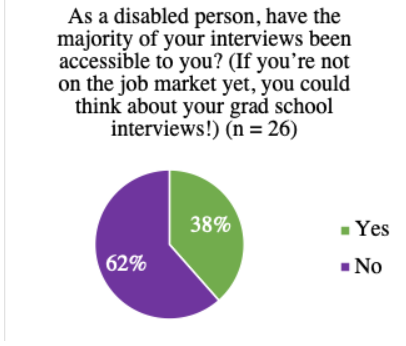
This demonstrates a culture that does not often think of disability. Most folks said that, while their uni has an LGBTQ center and a multicultural center, they don’t have a disability cultural center. This sends the message that disability is not something to be celebrated. 3/ 


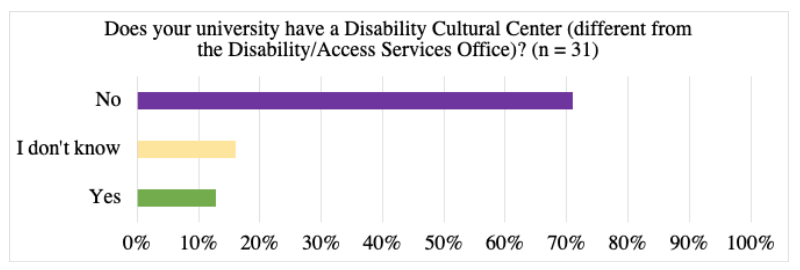


Our respondents also told us that stigma around disability and mental health issues is pervasive. Most students shared that they were not comfortable telling their advisor about mental health care needs. 4/ 
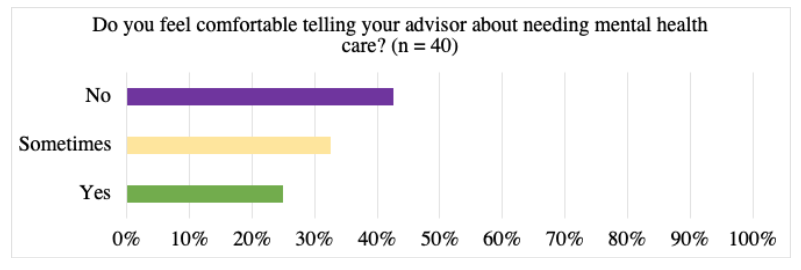
Further, respondents shared that they did not feel comfortable telling most of their cohort or classmates about their mental health needs. The pool of who disabled grad students feel they can talk to is narrow… 5/ 

It’s no surprise that grad students might feel uncomfortable about discussing mental health care - most respondents said they could get mental health care but that it was hard. Difficulty finding care is another indicator that you might not belong in this campus community. 6/ 

Nearly all respondents shared they had a limited number of on-campus therapy visits. Most have 4 or more visits, and are sometimes able to get more. Care limits are concerning given that mental health concerns are more common in grad students than the general population! 7/ 



In terms of formal accommodations, disabled folks who received accommodations in both undergrad and grad school remarked that their undergrad better met their accommodation needs (Very few respondents). Perhaps the “system” is more set up to expect undergrad accommodations? 8/ 

Respondents also shared that while most had their accommodations approved, many only had some of what they believed they needed approved. And often (though not always), it is non-disabled people deciding what accommodations are truly “needed” or “reasonable”. 9/ 

Further, most respondents had a professor fail to provide accommodations and when this happened, it required Months of advocating for and stressing over the accommodation. This is a lot of labor On Top Of the typical amount of work expected of grad students. 10/ 

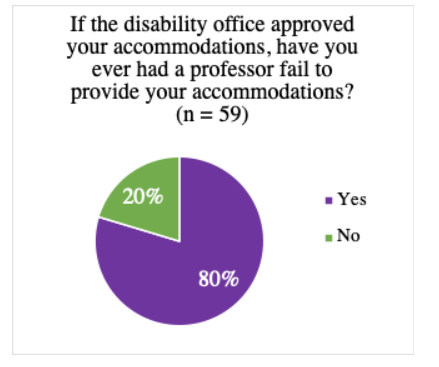

For grad students who served as teaching assistants (TAs), most respondents remarked that they needed but did not receive accommodations in this role (Very few respondents). As a grad student, you can be in an awkward middle ground of both student and employee… 11/ 

On top of all of this, grad students’ health insurance is overwhelmingly tied to student enrollment status, meaning if they take time away from the program, they will lose their health insurance. 12/ 

Those who considered taking a leave of absence and factored healthcare cost into their decision overwhelmingly stayed without taking leave. Forced decisions like this have the potential to worsen the health challenges that necessitated considering a leave in the first place! 13/ 

Half of respondents shared that they spend 10-25% of income on healthcare costs. Given that grad students only make between 20 and 30k on average, this can put them in a difficult position. For grad students are already rent burdened, this leaves little for emergency funds! 14/ 

Finally, more than half of grad students said they needed to work an extra job to pay for healthcare, but more than half of those students who needed an extra job were not allowed to take one, presumably due to their programs. 15/ 

Given all of this information, disabled grad students, generally, are stressed, financially stretched, not receiving mental healthcare easily, not able to share their struggles freely, and are not receiving all of the necessary accommodations. #NDEAM #DisInGradSchool 16/
Further, career development offices don’t often provide training specifically for disabled job seekers, one of many factors that make it harder for disabled grad students to get jobs as faculty members. 17/ 

And we can see a potential impact of this lack of targeted career preparation when many disabled grad students say that they do not feel prepared for the job market. Cumulatively, lack of targeted support and ableism in the academy might contribute to our next finding… 18/ 

Most respondents also shared that they have not knowingly had a disabled professor. It’s not surprising that most faculty are either not disabled or hide their disability, possibly related to their own experiences with the lack of accessibility in grad school. 19/ 
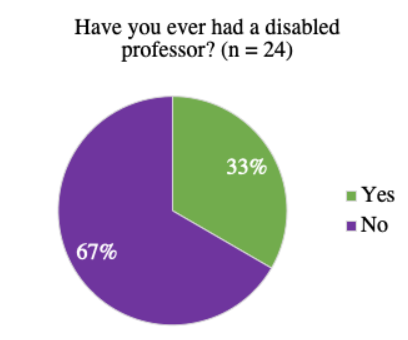
Faculty and grad students are often expected to attend conferences to demonstrate their activity in their field and be competitive for hiring or promotion, but most respondents shared that they have avoided attending an event due to inaccessibility. 20/ 

Even when respondents requested an accommodation for an event, it was either outright denied or “forgotten” about (Very few respondents).This suggests that conference organizers cannot be bothered to accommodate disabled people. 21/ 

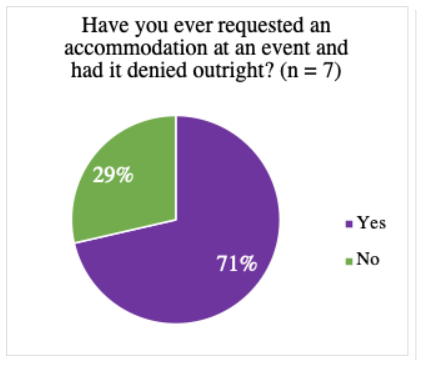
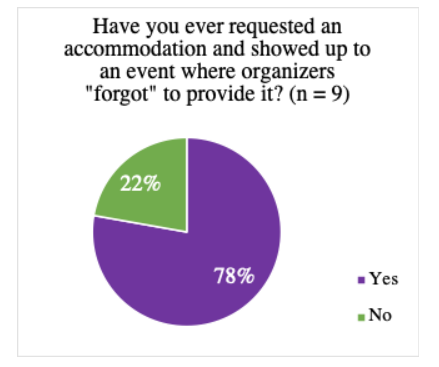
Given this thread, the academy has a lot of work to do when it comes to accommodating disabled people. One way that you can help is today’s Call to Action: share this thread and tag your institution! #NDEAM #DisInGradSchool @AcademicChatter #DisabilityTwitter End/
(This tweet needs a correction - it's not more than half of students who needed an extra job were not allowed. It's *some students*. Our apologies.)
• • •
Missing some Tweet in this thread? You can try to
force a refresh


